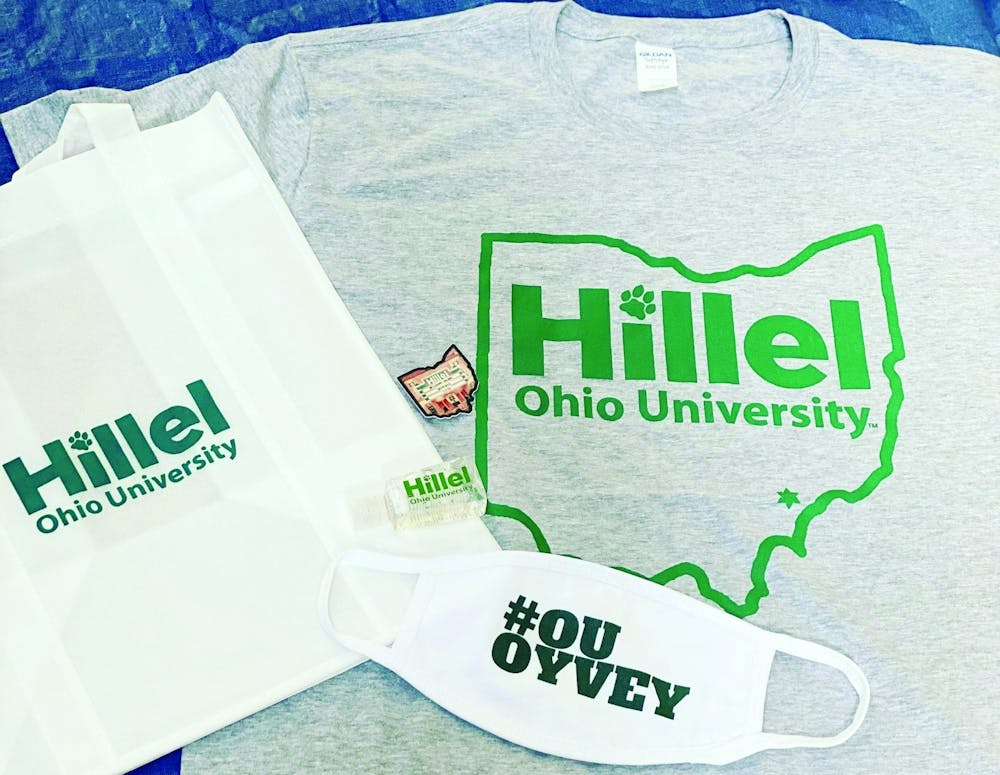The coronavirus pandemic has put a damper on several clubs and businesses between Ohio University and Athens, but OU Hillel isn’t one of them.
Sarah Livingston, executive director of Hillel at OU, worked with the rest of the Hillel team to keep their members active, as well as involve new students.
For the Jewish community, Hillel offers the Athens Jewish book club which meets almost monthly, now through Zoom.
“It’s a way that we keep our older community members that really need some connection connected in a simple way,” Livingston said.
In addition, Hillel is offering “Shabbat To Go,” which is a weekly dinner they used to hold in-person with a religious service, but now pack up for whoever wants one. These dinners celebrate the Jewish sabbath, or the day of rest. For older members who are at a higher risk, there are student volunteers who deliver the dinners so they don’t have to miss out.
“I felt like it was the bare minimum,” Livingston said. “I always worry I’m not doing enough.”
Hillel interns Hannah Movshin and Jason Tischler believe Livingston is not just doing enough, but is going above and beyond for the organization. Both Movshin and Tischler are doing their best to help out by hosting events, finding out data and information about students and engagement and contacting people about getting involved and staying involved as much as possible.
Hillel is also hosting events every week to keep students engaged. They have a craft night coming up through Zoom, a virtual JackBox game night and more fun activities. They even held a freshman mixer to get new students involved with the organization.
They’re even offering swag bags to students, alumni, faculty and staff that include a Hillel t-shirt, a #OUOyVey facemask, custom OU Hillel stickers and a Hillel hand sanitizer.
Further than group events, gifts and dinners, Livingston said the staff has been trying to set up Zoom coffee dates or get-togethers with members as a more personal way to connect with them during this time.
“Just to generally make sure that they know that we're there for them,” Livingston said. “That's been the biggest focus of all is just making sure our students know that they're our priority and we're doing everything in our power to make sure that they know that we're here to create a really amazing experience in Athens, for their Jewish college experience.”
Tischler, a junior studying physics, knows that some students are lucky enough to be living in Athens right now, be it an apartment or a house. However, most students, especially freshmen, haven’t had any college experience yet other than virtual courses.
“It's just like a prolonged first two three days of being on campus where you don't know the organizations you're interested in or what friend groups you might adapt to, you’re just kind of going through courses online and alone,” Tischler said. “So I think it's important to show that there is still campus life, even in times like this.”
Movshin, a junior studying occupational therapy, knows that for a lot of students, Hillel acts as a safe space. She feels that especially when people are stuck at home, they need to have some sort of outlet where they feel comfortable, and she works hard to make sure Hillel is that.
“We have students who can't come out to their parents or don't feel welcomed anywhere else, so Hillel is that place for them,” Movshin said. “Or they feel more attached to their religion than their family does, so they don't go to Shabbat services and right now. Most temples and synagogues are closed. So we hold our services through online, either Facebook or Zoom. And it's all safe, and whenever those students have an issue, they have people that they can talk to. It's just a safe space where nobody's judged.”
Movshin and Livingston also emphasized the idea that not everyone has to be Jewish to be a part of Hillel. The organization is open to anyone who wants to participate, and Livingston personally invites as many people as she can to get involved.
“It's really easy to get lost and to feel disconnected,” Livingston said. “This environment can really breed a lot of negative emotions: you get fatigued, you're lonely, you’re sad or angry because what you thought your school year would look like isn’t looking like it should. The reason why we pushed so hard to maintain a sense of community and to build on the sense of engagement is because that's, I think, what people need right now: to feel some sense of belonging, in this very crazy and chaotic space that COVID-19 has created.”






